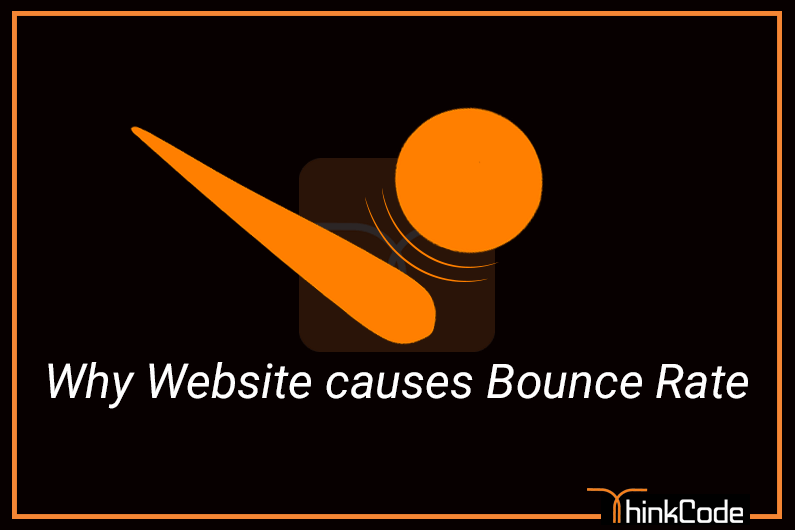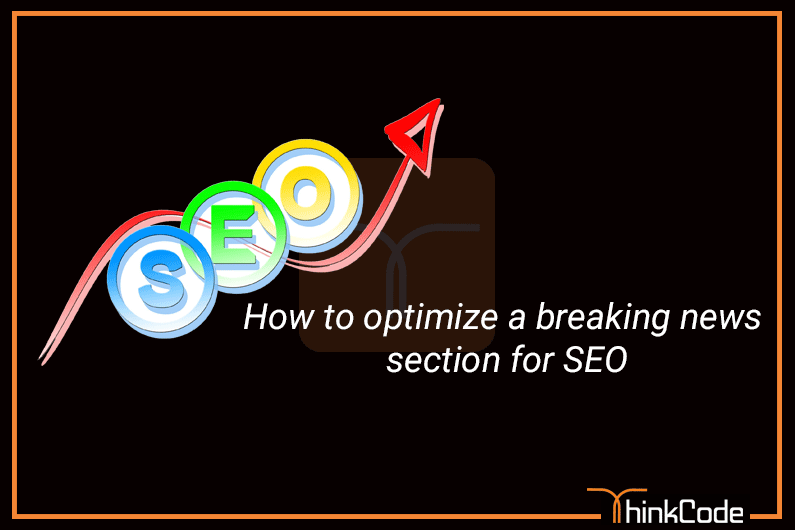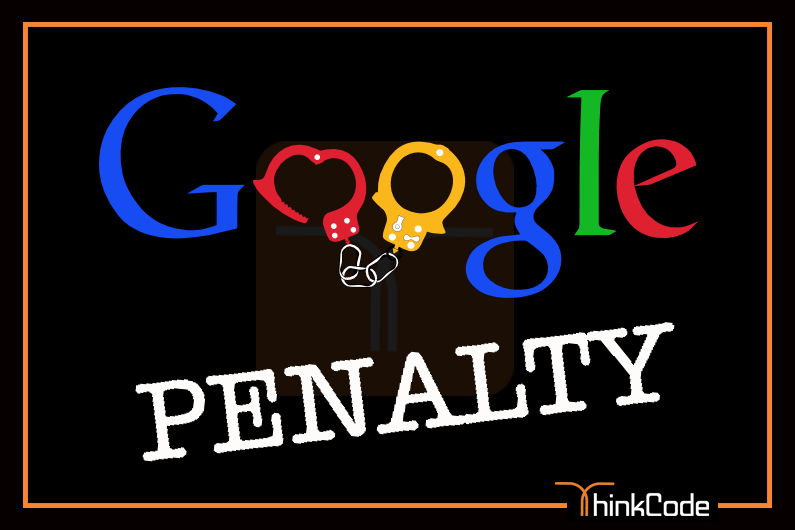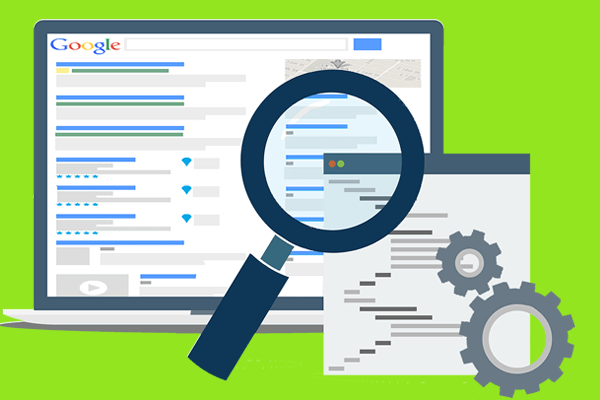
by ThinkCode | Feb 13, 2016 | Search Engine Optimization
Bounce Rate is the percentage of visitors to a particular website who navigate away from the site after viewing only one page.
When you visit a website, is there something that causes you to immediately leave a site.
Here are some basic tips that can help you to reduce the bounce rate.
- If the content of the site does not match the expectations then it will increase the bounce rate.
- Poor informational architecture and confusing navigation.
- A huge pop-up that covers the whole text area that doesn’t have an easy to get to close button before I even started reading the article.
- A large amount of ads in the content area makes us think that this is not a high-quality website
- Auto-play videos, or video ads on the side
- Asking me to sign-up for no reason
- Taking too much time to load up
- Re-appearing pop-ups that re-pop every time I close them
- Animated blinking ads
- unreadable poorly formatted text
- Slow sites which are also not optimized for mobile devices.
- Sites that promise something in their ads/ social links that take users to them but are in reality something different or not up to the mark or expectations.
- Having to give my email address in exchange for something that is normally given away for free (like a PDF or a 5 page “ebook” disguised as a PDF)
- A bad web design: Design is more important that ever these days. UI/UX factor is more valuable than the links if you want to beat your competitors and wanted to get top ranks, then UI/UX is your best choice. you can hire amazing designers to work with you (At thinkcode, we help you for the better UI/UX)
- No clear selling point.
Hope above mentioned points will help you to reduce bounce rate of the website.

by ThinkCode | Feb 6, 2016 | Search Engine Optimization
The content for breaking news is a thin content which is a downside for the SEO.
Assuming GoogleBot visits your site often enough so that breaking news is not old news, you need to do a good job with your sitemap.xml file.
Specifically, for the page with the breaking news, code the <lastmod> tag with the date of the most recent news.
You can also code the <changefreq> and <priority> tags, but don’t assume that if you say the page changes hourly that Google will come back hourly.
Apart from the above-mentioned things, Google daily maintains the trends in a separate database and keeps a tab on the latest published content on those topics in order to cover the content from the sites those are not or never indexed by it so far.
Here, “latest news” kind of words will not be considered by it as a keyword and semantic search will take place at here. This is the reason while we see some the breaking news results in Google, there will be many pages those are not yet indexed by Google too.
Apart from this kindly consider the following things.
- Submit your website on Google news (if the content is unique)
- Use Meta News Tag
- Improve your website social presence
- Make your news title catchy
- Share your news on social media platforms.

by ThinkCode | Jan 19, 2016 | Search Engine Optimization
If Website is get penalized by any algorithms, how would we come to know it?
There are a lot of websites who indicate if your website got some problems. But you can do some research on Google
You can do that first (if you have Google Webmaster Tools) login to the account and you will see there if you are under penalties or not.
There are 2 types, one is Manual Penalty: A human (probably from the webspam team), imposed a penalty to your website. This can happen because of a number of reasons and it can be either site-wide i.e. affecting the website as a whole or partial i.e. affecting only some pages of your site.
When this is the case, Google will give you an indication of what the problem is together with a list of actions you can take to correct the issues. Once you make the necessary changes, you can submit a reconsideration request and they will tell you if the penalty has been removed or not.
The other is Algorithmic Penalty: This is the most common type and it is automatic. Algorithmic penalties are not reported to webmaster.
If you think a website’s visibility/SERP’s has been penalized from a Google update and there are no manual penalties in your Google Search Console, here is a method to check the validity of your hunch.
- Want to look for your website visitors. Go to Acquisition > Source/Medium
- The click “google / organic” which will let you segment this channel.
- Change the report dates to include several months behind when you suspect the website was affected by a Google search update. * Note normally we include at least a whole previous year of data to rule out a false positive from seasonality.
- Using the report’s graph look for a sharp downward trend which maintains itself over a few weeks or months. Depending on the time frame of the report you might want to change the graphs display to weeks or months.
- If you find a consistent dip take note of a few weeks during and around the traffic loss.
If you find a match between a date of known Google algorithm update and the loss of traffic both the above websites offer additional information about the type of update. Also like to mention there are a few services, such as Fruition, that offer “Penalty Checkers” services that we have found helpful.

by ThinkCode | Dec 21, 2015 | Search Engine Optimization
A question like this is really to general to be answerable. To be able to qualify a person to handle SEO for you, you need to understand SEO principles yourself. Then, ask the person you are about to hire questions based on your own knowledge of the answers.
It would depend on whether you were hiring a full-time in-house SEO (an employee) or a consultant/agency to which you wish to outsource your SEO. It also depends on whether you’re looking to rank in local listings for local goods/services or wanting to compete nationally or internationally. These are very different skillsets.
When inviting candidates for an interview ask them to have a look at your website with their “SEO-glasses” on beforehand also ask them to bring/prepare examples of SEO projects they have done before and how these performed and how they could relate to the present job situation/your websites. As a minimum, check their references on LinkedIn and call those persons listed as references. Nothing beats a one-on-one conversation on the phone about a potential employee with his/hers previous employers.
We believe the questions you need to ask should be centralized around your SEO goals and how this person plans to accomplish these goals. We assume that because you are part of this group, you have a least the very basic knowledge of SEO in general, so ultimately, we would wait to hear how this person responses to my SEO goal then decide who is a better fit In our opinion, if you are not extremely knowledgeable about SEO, your best approach to interviewing a potential SEO candidate is to pay someone with a lot of SEO experience to interview them for you. Otherwise, the candidate might “seem” impressive while all the while blowing smoke.

by ThinkCode | Dec 15, 2015 | Search Engine Optimization
SEO will still be important, it’s just changing and digital marketers need to understand how SEO has evolved. “Old School” SEO doesn’t work as well and can get a site penalized. SEO is blending with social media and requires a strong content marketing strategy. Social signals (people sharing the content) and links from authority sites are the focus and can produce the best results.
Also, obtaining traffic from major sites where your target audience hangs out is more important than just achieving a page one ranking in Google. Total traffic is the new goal as opposed to just a page one ranking.
What we see becoming a major part is branded search – ranking for a business name as part of a keyword phrase. Customers are searching to see a business’ reviews, testimonials, social media activity and helpful content posted about their niche before they decide to do business with them. Creating an optimized branded network can provide a competitive advantage for your clients. It needs to be mobile responsive as well.
Also optimizing content specifically for keyword phrases is evolving into creating content that is topical and can rank for more broad terms. However, you still need to look at the competitiveness of the content in order to rank. However, even posting competitive topics to social media groups can get targeted traffic and can be shared.
Lastly, video is going to become even more important both individually, as well as part of media rich posting (video, images and text with links out to authority sites.) We have developed an interactive video platform for marketers to help them get more results from their video marketing efforts. In two years or so, the major of content posted will be video according to the latest statistics.
[easy-tweet tweet=”SEO was, is and will be important for Digital Marketing. ” hashtags=”#seo #google”]The only thing is now it must be smart and strategic.

by ThinkCode | Dec 10, 2015 | Search Engine Optimization
Rankings are pretty much worthless these days due to personalization and localization. Google shows different results depending on your previous searches (search history). They also change depending on which results you clicked on previously and likely whether or not you bounced once you clicked through.
Additionally, rankings in New York are totally different than those in Miami which are different than those in Houston which are different than those in Los Angeles. Results vary even more widely between countries.
If you’re looking for fairly reliable rankings in the US, for example, you would need to pull rankings for the same keyword in 25-50 major cities around the country (using proxy IPs that resolve to each of those cities) and then average them. Also need to clear search history, cookies, etc. after each individual pull.
If you want to do a spot check to see if a site comes up on the first page or two of Google, we will turn on a VPN which anonymizes my IP address and changes my location to something semi-random. We use private browsing too. It’s interesting to see how different the search results are when this is done.
Remember that search engine results are now highly contextual to the searcher’s environment, GEO, device, history etc. With so many variables unique to the individual searcher you will never be able to replicate the same context and develop a reliable ranking report by which to track progress. You can make some generalities; however these results will often be misleading and could result in your pursuit of false goals.
The best way to influence search results is to build a massive Google+ network because it really pays off. When people in your network (which include your 2nd and 3rd degree connections) perform a search for a product or service that you’re relevant for, all things being equal, you will appear higher to that searcher than sites that are not in any way linked to the searcher. This is particularly relevant to local search.
Below is the list of few tools which you can use for keyword ranking
- Advanced Web Ranking: – It can be configured to different locations.
- RankTrackr:– Track rankings with precise accuracy in an area of your choice.
- seomonitor.com – You can monitor you campaign evolution and immediately spot new opportunities that can help you grow your traffic, conversions and revenue.
















